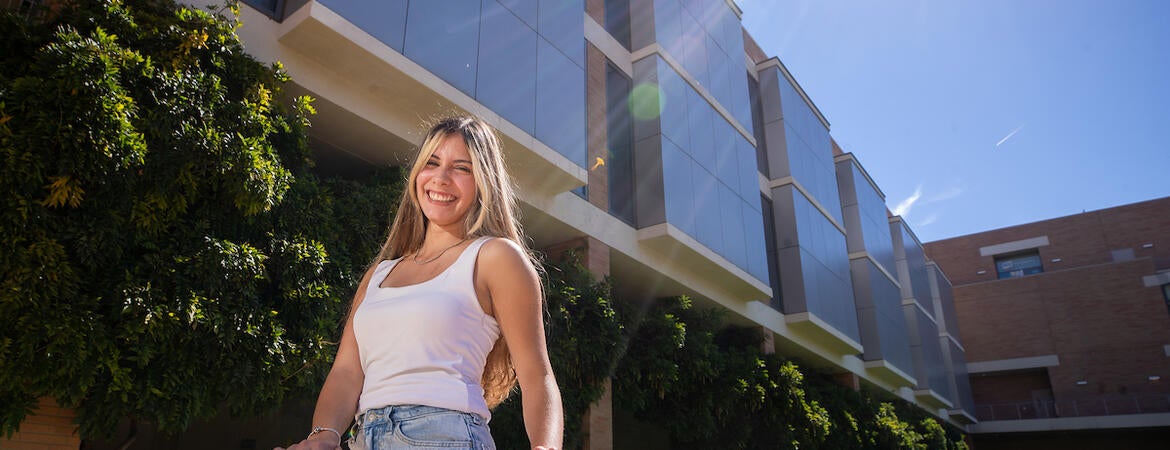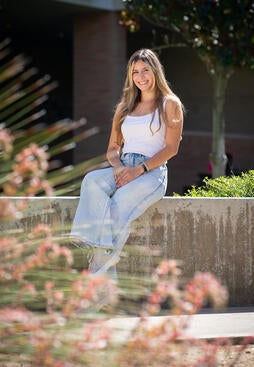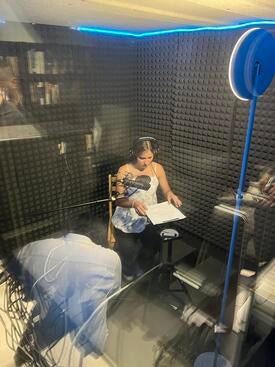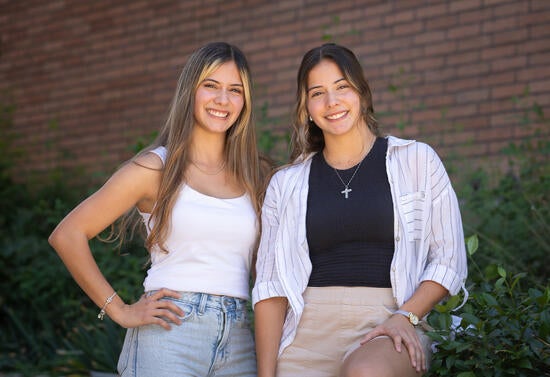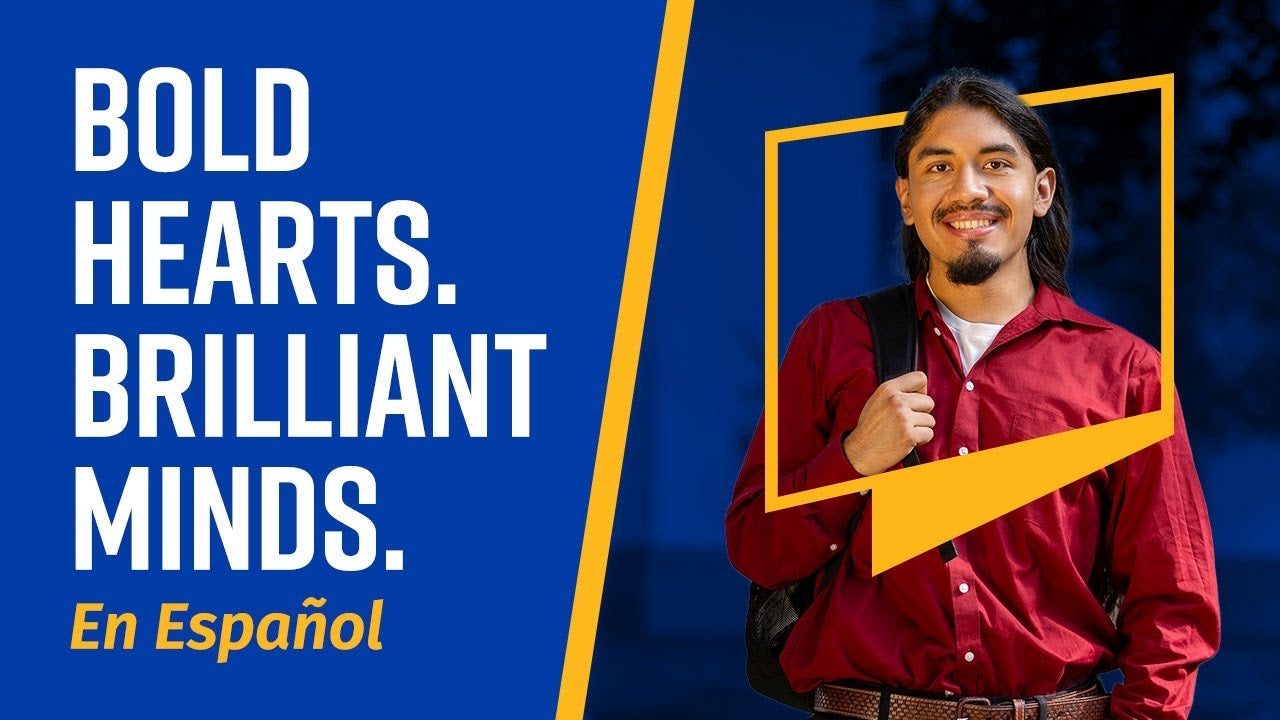When Camila Acosta left her native Venezuela as a 15-year-old, she never imagined she would be the voice of UC Riverside to a new generation of Latino students and families.
Acosta provides the voice-over for a new Spanish-language UCR video as part of the “Bold Hearts. Brilliant Minds.” campaign, narrating how the diverse campus brings together first-generation students and world-class researchers to transform lives.
A 30-second version is airing as a commercial during Hispanic Heritage Month as part of UCR’s outreach to Spanish-speaking families while a 60-second version was posted on YouTube in late September. The aim is to share UCR’s affordability, value, and impact on the lives of graduates and their communities, especially those who have been historically underrepresented within higher education, said Luis Bravo, director of enrollment marketing with University Relations.
Acosta was selected by a panel of University Relations staff members who come from Spanish-speaking households.
“Camila did an extraordinary first read and we were impressed with her pronunciation, eloquent tone, timing, and her family story,” Bravo said. “We knew students from Spanish-speaking families would immediately connect with her.”
A fourth-year student majoring in economics and administrative studies with a concentration in project management, Acosta learned about the opportunity through the marketing team at the College of Humanities, Arts, and Social Sciences, where she works as a student event assistant.
Acosta, 21, wanted to use her voice for Spanish-language families, thinking of her own parents and how they were eager to experience UCR through its orientation and other programs. Acosta’s identical twin sister, Andrea Acosta, is also a UCR student.
“I would like other people’s parents to also feel welcome,” she said.
Representing UCR is a proud moment for Acosta and her family, who left Venezuela in 2018 due to political persecution. Their mother was a gynecologist at a public hospital where she wanted to provide medical treatment not just for those connected to the military, but civilians in need.
“She was one of the very good ones and she advocated for everyone,” Acosta said. “She wanted equality for everyone, equality in treatment. That’s why they went after her.”
Her mother was warned to keep quiet and soon the family started receiving threatening calls in which they would mention details about where Acosta and her sister studied and where their aunt lived.
Acosta also recalled the stress of food, medicine, and fuel shortages, noting how they would have to wait in long lines for basic necessities.
Still, Acosta, who was born in the city of Puerto Cabello and grew up in Barinas, loved Venezuela and never wanted to leave. As a teenager, she proudly wore a Venezuela t-shirt and created a poster celebrating the country.
The move to the U.S. came suddenly. Her father, a manager at a car dealership, told Acosta and her sister they were going on a trip for their quinceanera celebration. They left first, followed by their older brother and then their mother, traveling separately not to arouse suspicion.
The family received political asylum and moved to San Diego where they stayed with an uncle. It wasn’t until they moved that her parents explained the reason, said Acosta who remembers seeing her mother crying and under stress back in Venezuela.
The transition was difficult for Acosta and her sister as they navigated high school in a new environment and language. When she and her sister started looking into applying for college, a high school adviser suggested that they may be better suited for a two-year college. She told them their English wasn’t very good and they may have a hard time at a four-year university or college, Acosta said.
“After that, we were very scared,” Acosta said. “We were thinking `Oh, my God, we’re not going to make it. It’s going to be so tough for us.’”
But they persevered, with a family friend who was a counselor at another high school helping the sisters with their college applications.
UCR was a top choice for them due to programs such as business, economics, and psychology they had an interest in. They were also struck by programs supporting Latino and first-generation students as well as campus cultural activities. For instance, the fall 2022 Block Party, featured Puerto Rican singer Lunay who is popular in Venezuela and reminded them of home.
It was never any question that the sisters, who live together near campus, would go to the same school. They were both admitted in fall 2021.
“We try to stick together,” Acosta said, noting they support each other emotionally and financially.
Still, the first year was tough. Acosta felt insecure about whether her English was good enough, about adapting to college, and doing well in her classes.
“But UCR made it so smooth, so easy, in terms of feeling this sense of belonging,” she said.
Professors and classmates encouraged her and told her not to be so hard on herself. A significant turning point came when both sisters volunteered at the Undocumented Students Program. The experience taught Acosta not to put limits on what she can do and to take advantage of the opportunities offered at UCR.
The program also helped her and her sister to find campus internships. Melanie Ramiro, a performing arts marketing specialist, and Julie Salgado, director of CHASS events, who work with Acosta, said they’ve been impressed with her work.
“Camila has stepped out of her comfort zone and has really grown professionally,” Salgado said. “Her tenacity has made our CHASS events team better.”
Although she had no experience in broadcast work, Acosta prepared diligently for the recording session listening to the English-language version of the UCR video and other presenters. She knew she wanted to speak in an empowering voice. After her recording session, she proudly shared photos from the recording booth with her mother.
Andrea Acosta said she couldn’t believe it was her sister at first when she sat down to watch the video with friends.
“She was so confident with everything she’s saying,” Andrea said. “After that video, I felt so proud to be a Highlander.”
Camila Acosta said it feels good to be part of UCR’s outreach to the Latino community.
“UCR opened up this mindset I had and said ‘No, you can do it, and you can do more,’” she said. “If there is another person feeling the same way, that ‘I can’t study or do this or my English is bad,’ I would say keep going because opportunities are going to come but you have to work for it.”
